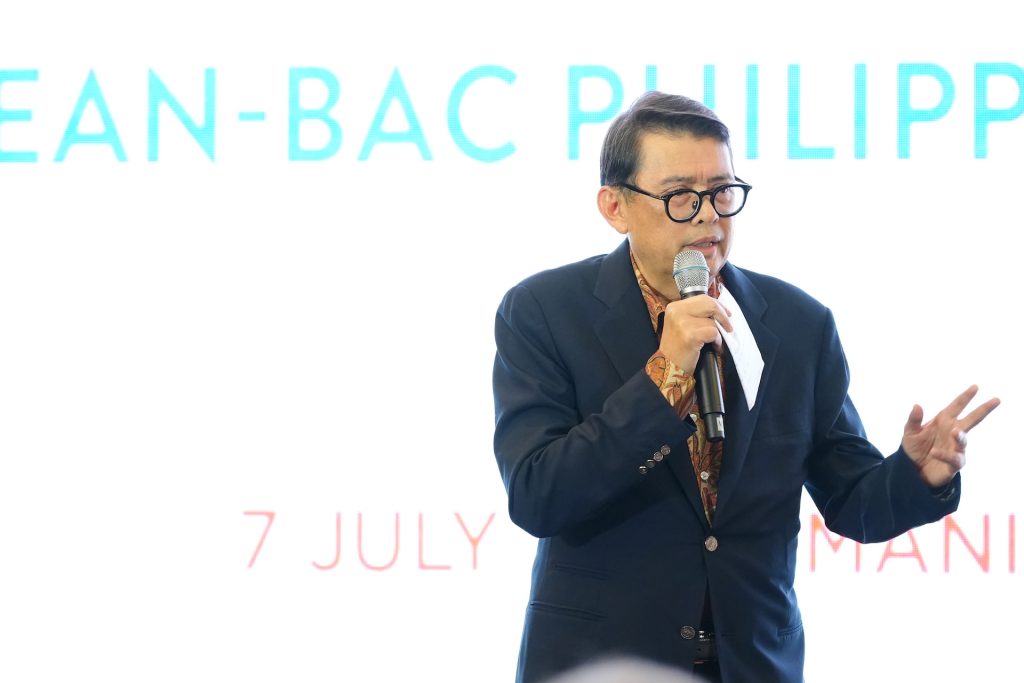
Quezon City MSMEs Get Entrepreneurship Boost From Go Negosyo’s 3M On Wheels
July 12, 2025
MSME Summit 2025
July 19, 2025
Working Toward a More Relevant Asean
Whenever we host events like the ASEAN Summit, the biggest concern of people is that it will cause traffic. We have to change that. It has to become relevant in the lives of every citizen in the region.
I say this because next year, the Philippines will once again host the ASEAN Summit. The last time this happened was in 2017. It was a landmark year, too, as it was the 50th anniversary of ASEAN. I am told there were more than 20 agencies that worked together 24/7 that year. There were even window hours for trucks at the Subic-Clark-Tarlac Expressway and the North Luzon Expressway from Clark to Balintawak, and also along EDSA from Balintawak to Magallanes.
The Negative Nellys, of course, couldn’t see past the cost and the hassle of the undertaking. Still, I can tell you now, speaking as the chairman of the ASEAN Business Advisory Council (ASEAN-BAC) at the time and being in the thick of things during ASEAN 2017, we reaped so much more in return. It was an astounding success. The Philippines made such a big impression with how well it handled the event, and how ready it was to finally shed the “Sick Man of Asia” tag.
Last week, we at the ASEAN-BAC gathered in Manila to reflect on how our advisory role as private sector to our respective governments can become more agile, forward-looking and effective. All were in agreement that we must help people understand that ASEAN is not for big business alone. We are here so that small businesses can scale up, and that this must be our guiding principle as we move forward. The perception that ASEAN events primarily serve the interests of large corporations must change. We must ensure that our initiatives resonate with the lives of everyday citizens and provide real benefits to those at the grassroots level.
That was why a very important portion of our gathering was dedicated to the dialogue with DTI Sec. Cris Roque. She shared that the government is focused on empowering MSMEs, developing digital talent, promoting creative industries, enhancing economic security and strengthening energy resilience. This highlights a comprehensive approach that aims to create a more inclusive and resilient economy for the Philippines, one that can work well with its ASEAN neighbors.
These priorities resonate deeply with my own aspirations for the organization. The emphasis on MSMEs, particularly those led by women, the youth and the OFWs, aligns with the goal of humanizing the organization and making its purpose and benefits felt by everyday citizens. To achieve this, we must prioritize inclusive dialogue that engages various stakeholders. By listening to the voices of MSMEs, farmers and local communities, we can craft policies that reflect their needs and aspirations. Our goal should be to create a seamless connection between government initiatives and the realities faced by our citizens.
Ensuring that our organization goes beyond highlighting changes in leadership and annual chairmanships is crucial. We must lay the groundwork for a legacy that transcends individual tenures, fostering collaboration and innovation across the region.
Later that day, ASEAN-BAC Philippines invited more of our friends in the government and private sector to give a preview of the Philippines’ ASEAN-BAC Chairmanship in 2026. Judging from the excitement and the attendance of the country’s most important people (among them First Lady Louise Araneta-Marcos and former Philippine president and now Rep. Gloria Macapagal Arroyo), everyone understood how things are gearing up for ASEAN today and in the coming years.
It is an exciting moment for countries in the ASEAN. Already, the region, as a bloc, is a formidable magnet for foreign direct investments and, despite recent geo-economic challenges, it has done well relative to the rest of the world. It will not be a surprise if we see some of the biggest influxes of trade in the coming years.
Although the evening’s event was a high-level diplomatic and business reception, at the forefront were the sectors that will be front and center of our legacy projects during the Philippines’ chairmanship: MSMEs and food security, two issues that resonate with ordinary citizens. MSMEs employ millions in the region, and food security is becoming an important issue amidst global geopolitical tensions and climate change. These challenges are multifaceted, some of which we have never faced before. But I am confident that with regional cooperation, we can navigate these challenges and seize the opportunities that lie ahead.
Originally Published in Philippine Star


2/F RFM Corporate Center, Pioneer cor. Sheridan Sts. Mandaluyong City, Metro Manila, Philippines

